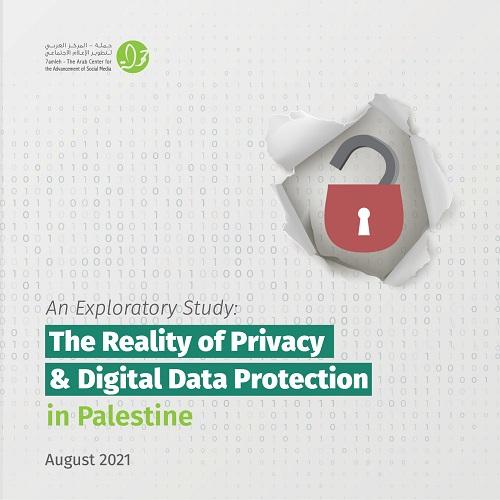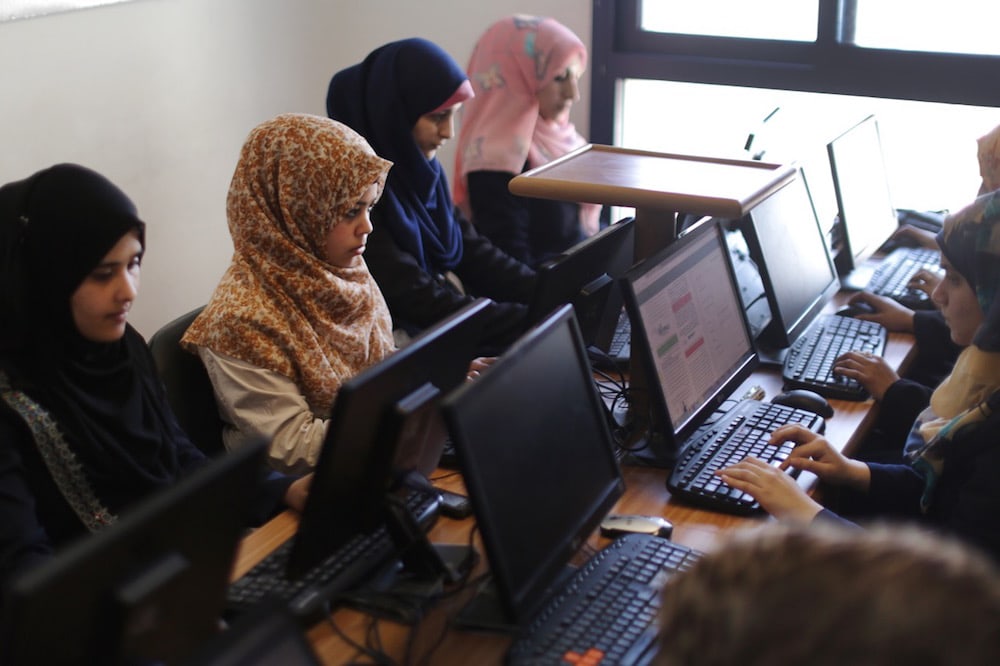A new study by the Arab Center for Social Media Advancement (7amleh) examines how Palestinian digital privacy rights are being violated, and highlights the growing need for a comprehensive data protection law.
This statement was originally published on 7amleh.org on 25 August 2021.
7amleh – the Arab Center for the Advancement of Social Media released a new investigative study titled “The Reality of Privacy and Digital Data Protection in Palestine” during a study day, specifically designated, to discuss the issue of privacy and digital data protection for Palestinians. The event was held digitally via the “Hopin” platform, with the participation of a number of specialists and representatives from different sectors and over 110 participants.

This investigative study, which is the first of its kind in Palestine, attempts to examine and analyze the reality of privacy and data protection in Palestine, and addresses the different violations against Palestinians’ privacy and data by various parties. The report showed that there is a strong interest among Palestinian users in introducing a new law on privacy and the protection of their data.
The report also showed that companies are not transparent about a majority of information they collect, and the nature of its use, processing, and sharing with external or internal third-parties. These operations take place secretly and in the absence of an authorized oversight body or an official law that protects the privacy and data of Palestinians in general, and their digital data in particular. This means that Palestinians cannot truly know the extent to which their data gets violated on a daily basis. The report also pointed to the deficiency of the Palestinian Basic Law as well as the Electronic Crimes Law, in this regard, as these legislations only address “personal data” in the traditional sense and are not sufficient to ensure the protection of digital data.
In the context of this study, 7amleh asked a set of closed questions to a number of focus groups, and found that 31% of the respondents do not clearly know the meaning of personal data and 51% do not understand the meaning of digital privacy, while 89% supported the immediate enactment of a law on privacy and personal data in Palestine and 91% expressed the need to protect their personal data and digital privacy.
The study further presented a set of recommendations to protect the right to privacy and digital data of Palestinians, including: the formation of a Palestinian oversight body assigned with ensuring the protection of Palestinians’ privacy and regulation of the use of their personal data; the need to pass a comprehensive law on privacy and protection of Palestinian digital data; and the importance of raising awareness on the issue of privacy and data protection in Palestine, both on a popular and official level.
The study day presented the findings of this study through holding a discussion with the researcher, while a follow-up session was organized to comment on the research, with speakers from the Palestinian Ministry of Communications, the Palestinian Digital Rights Coalition (PDRC) and the Palestinian Monetary Authority. Furthermore, a final session was held focusing on the future of this issue at the regional level, involving speakers and regional experts from Egypt, Jordan and Palestine.
During the discussion in the follow-up session, Mahmoud Ifranji, a member of the PDRC, confirmed that the biggest obstacle before enacting a law on privacy and data protection in Palestine lies in the complexity of the Palestinian context. Particularly, the absence of an active legislative council prevents any conversation on enacting such a law on privacy or data protection.
On the other hand, Mona Shtaya, the Local Advocacy Director at 7amleh, in a session discussing the horizons of the issue of privacy and data protection in the Arab World, focusing on the principles needed to commit to in the introduction of a new law on the issue in Palestine, added “It is important that Palestine stays committed to all international agreements it has signed on, and to ensure that local legislations are consistent with these agreements. Further, it is important to ensure along the rights to privacy and data protection, other important rights, such as the right to be forgotten and the right to edit and correct. It is also important that this law learns from the experience of the European General Data Protection Regulation (GDPR).”
This event comes as part of 7amleh’s advocacy work on Palestinian Digital Rights, which ultimately aspires to achieve a safe, fair and free digital space. The issue of privacy and digital data protection in Palestine remains in need of in depth examination and as the report recommends, urgently needs to be addressed by the enactment of a Palestinian law on privacy and data protection.



